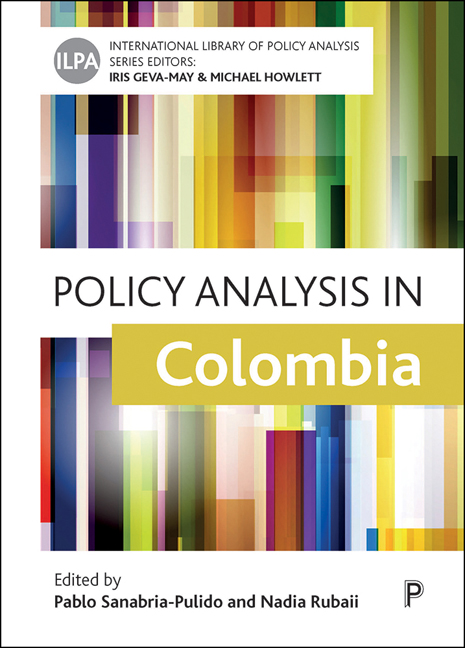Book contents
- Frontmatter
- Dedication
- Contents
- List of Figures and Tables
- List of Abbreviations
- Notes on Contributors
- Editors’ Introduction to the Series
- Policy Analysis in Colombia: An Introduction
- Part One Policy Analysis in Contemporary Colombia
- One The policy Analysis Movement in Colombia: The State of the Art
- Two Evolution of Policy Analysis as a Field of Study and Instruction in Colombia
- Three Policy Analysis, Bureaucratic Capacity and Public Administration Reforms in Colombia
- Part Two Policy Analysis within National and Subnational Governments
- Four Policy Analysis Inside Central Government in Colombia
- Five Policy Analysis and the Legislature in Colombia
- Six Policy Analysis in the Colombian Constitutional Court
- Seven Metropolitan Governance and Policy Analysis in Colombia
- Eight Policy Analysis for Decision Making in Colombian Local Governments
- Part Three Policy Analysis in Key Policy Domains
- Nine Policy Analysis in the Education Sector in Colombia
- Ten Policy Analysis in the Health Sector in Colombia
- Eleven Policy Analysis and Decision Making in the Military Forces: The Havana Experience
- Twelve Technocracy, Decision Making and Economic Policy in Colombia
- Thirteen Social Policy, Target Populations and Policy Analysis in Colombia
- Part Four Policy Analysis Beyond the State
- Fourteen Political Parties and Policy Analysis in Colombia
- Fifteen Policy Analysis and NGOs in Colombia
- Sixteen Media, Evidence and Policy Analysis in Colombia
- Conclusion: Building Capacity for Policy Analysis Amid Tensions and Challenges in Colombia
- Index
Fourteen - Political Parties and Policy Analysis in Colombia
Published online by Cambridge University Press: 10 March 2021
- Frontmatter
- Dedication
- Contents
- List of Figures and Tables
- List of Abbreviations
- Notes on Contributors
- Editors’ Introduction to the Series
- Policy Analysis in Colombia: An Introduction
- Part One Policy Analysis in Contemporary Colombia
- One The policy Analysis Movement in Colombia: The State of the Art
- Two Evolution of Policy Analysis as a Field of Study and Instruction in Colombia
- Three Policy Analysis, Bureaucratic Capacity and Public Administration Reforms in Colombia
- Part Two Policy Analysis within National and Subnational Governments
- Four Policy Analysis Inside Central Government in Colombia
- Five Policy Analysis and the Legislature in Colombia
- Six Policy Analysis in the Colombian Constitutional Court
- Seven Metropolitan Governance and Policy Analysis in Colombia
- Eight Policy Analysis for Decision Making in Colombian Local Governments
- Part Three Policy Analysis in Key Policy Domains
- Nine Policy Analysis in the Education Sector in Colombia
- Ten Policy Analysis in the Health Sector in Colombia
- Eleven Policy Analysis and Decision Making in the Military Forces: The Havana Experience
- Twelve Technocracy, Decision Making and Economic Policy in Colombia
- Thirteen Social Policy, Target Populations and Policy Analysis in Colombia
- Part Four Policy Analysis Beyond the State
- Fourteen Political Parties and Policy Analysis in Colombia
- Fifteen Policy Analysis and NGOs in Colombia
- Sixteen Media, Evidence and Policy Analysis in Colombia
- Conclusion: Building Capacity for Policy Analysis Amid Tensions and Challenges in Colombia
- Index
Summary
Introduction
The end of the 20th century was chaotic for Colombian political parties. The 1991 Constitution inaugurated a period of transition from a bipartisan towards a multiparty system, but after that milestone, several electoral and political reforms were required to organize the political landscape and to strengthen the role of political parties as critical democratic institutions. In that process, political parties’ use of policy analysis could play a role in helping these consistently discredited organizations (Caicedo Ortiz, 2015; Latinobarometro, 2017; Cifras and Conceptos, 2018) to gain some of the elusive trust from the public and to support their role in public policy decision making. In that sense, this chapter aims to answer the following question: what are the factors that either exhort or prevent 21st-century Colombian political parties from utilizing policy analysis to transform their links with their voters and support their role in the policymaking process?
Comprehending politicians’ and political parties’ behavior, in this case that associated with the use of evidence-based analysis to support their activities, demands an understanding of the nature of political parties, their goals and forms of organization, the main political parties in the country, and the historical and institutional context framing their actions. In doing so, this chapter focuses on two of the fundamental activities or components of political parties: the “party in the electorate” and the “party as an organization”, which are largely conditioned by their corresponding party and electoral systems (Aldrich, 2011). Thus, the chapter observes Colombian political parties in one of their two main arenas of work, namely out of the legislature; their role in the second main arena of party action, that is, the “party in the legislature” (Aldrich, 2011), is further explored in Chapter 5 by Mónica Pachón and Manuela Muñoz, although some relevant aspects are also mentioned here.
To address the aforementioned question, then, this chapter is organized in four sections. The first section presents theoretical underpinnings that locate the role of policy analysis as a congruent practice with programmatic party structuration. The second section describes the historical trajectory of the Colombian party system, its make-up in the 21st century, and key institutional features affecting parties’ use of policy analysis.
- Type
- Chapter
- Information
- Policy Analysis in Colombia , pp. 241 - 256Publisher: Bristol University PressPrint publication year: 2020

